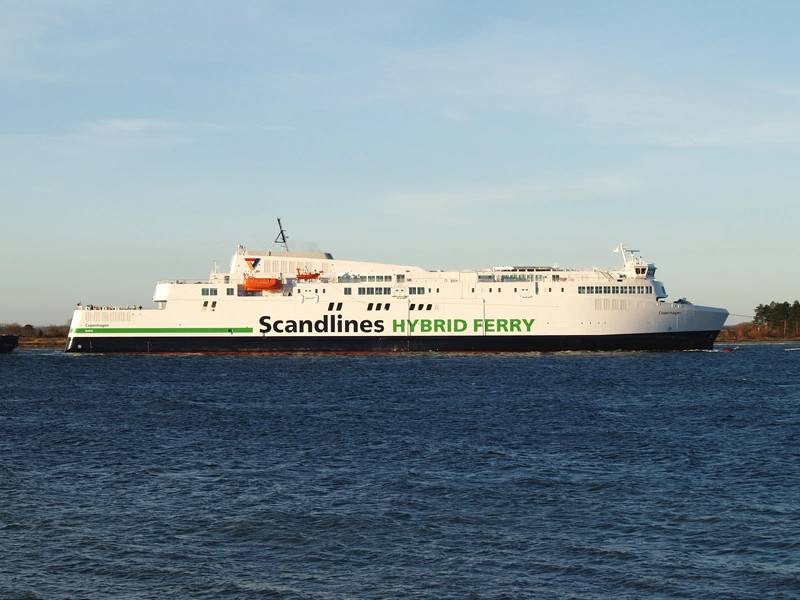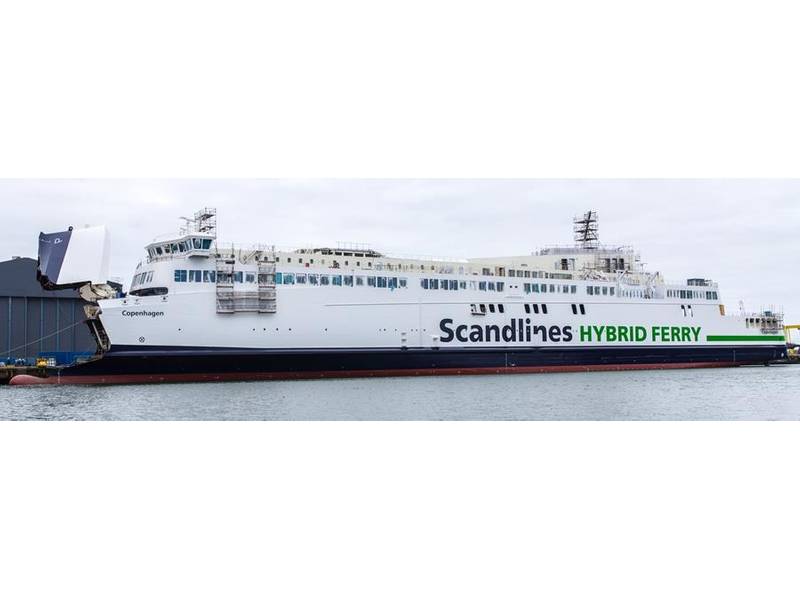Scandlines’ New Hybrid Ferry Named MV Copenhagen
The second of Scandlines’ two new hybrid ferries for the Rostock-Gedser route was named M/V Copenhagen during a ceremony at the Danish shipyard FAYARD A/S on October 28, 2016.
In his speech to the some 180 guests in attendance, Thomas Andersen, CEO of FAYARD A/S, thanked Scandlines for the confidence which the shipping company has shown the yard and he compared the new ferry with Hans Christian Andersen’s ugly duckling that finally turned into a beautiful swan.
The new ferry M/V Copenhagen, together with sister vessel M/V Berlin, will connect the capital cities of Germany and Denmark, just as the ferries on the route have done for more than a century.
“These two new ships stand as a testament to the success and growth of Scandlines over recent years,” said Sally Borrows, the Godmother of the vessel, before wishing the ferry, her crew and passengers a safe passage. Sally Borrows is married to Simon Borrows, CEO of 3i Group plc, which is today sole owner of Scandlines.
M/V Copenhagen will join the world’s largest fleet of hybrid ferries, utilizing a low emission and fuel saving diesel electric hybrid propulsion system powered by a Corvus Energy ESS (Energy Storage System). The M/V Copenhagen is the sixth Scandlines hybrid ferry to utilize a Corvus ESS.
At 169.5m long and 25.4m wide, the vessel provides double the capacity for vehicles (460 cars or 96 transport trucks), and the modern, spacious onboard facilities have enough space for 1,300 passengers. The main engines provide an output of 18,000kW, with a further 4,500kW available from the Corvus ESS. This results in a speed of 21 knots on the 1-hour 45 minutes long crossing.
Scandlines has gone to great lengths to ensure the M/V Copenhagen is environmentally friendly by utilizing technologies that increase fuel savings, reduce emissions and improve on-board energy efficiency. The vessel uses an optimized propulsion system consisting of propellers and two thrusters, which can be rotated through 360 degrees and are used in narrow waterways or during maneuvers in port. On the emissions front, the M/V Copenhagen has four scrubbers which remove harmful substances from the exhaust gases such as sulphur oxides and fine particles.
Energy-saving solutions are utilized wherever possible to reduce the amount of energy required to run the vessel, including LED lighting throughout and the use of variable-frequency controls to optimize energy usage. When consumption is lower, excess energy is stored in the Corvus ESS. This energy is then released when consumption is higher than generator production.
"It has been interesting, challenging and sometimes frustrating to be part of this project. On the other hand: we have all had to do our best to succeed,” said Søren Poulsgaard Jensen, CEO of Scandlines. ”All the more so, I am immensely proud to be able to welcome everyone on board our new ferry, even though I know there is still some finishing to be done so it will take yet a few weeks before the ferry goes into service.”
Soon Scandlines will offer not only one but two new hybrid ferries on the Rostock-Gedser route, which has experienced growth for the last couple of years. The first few months with M/V Berlin in service even show double-digit growth rates.
M/V Copenhagen is currently undergoing a comprehensive test program (Harbor Acceptance Tests). In late November, it will start on the sea trial (Sea Acceptance Tests), where the maneuverability will be tested under both usual and unusual conditions.
Scandlines expects M/V Copenhagen to go into operation before the end of the year.


